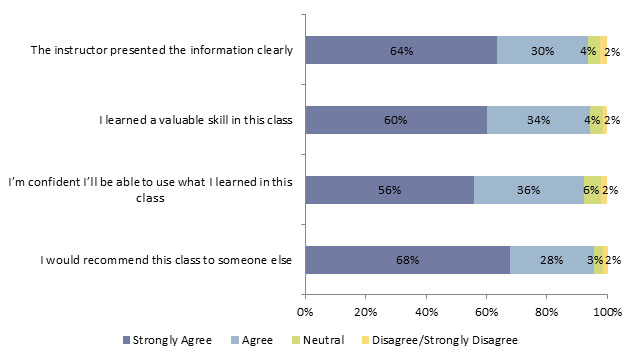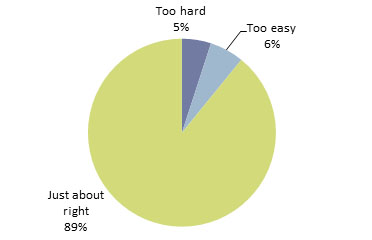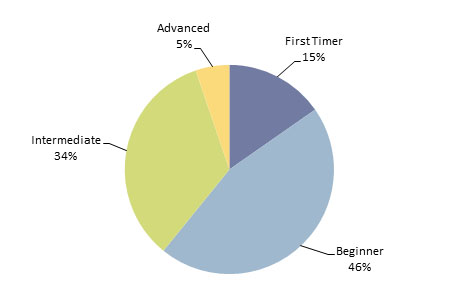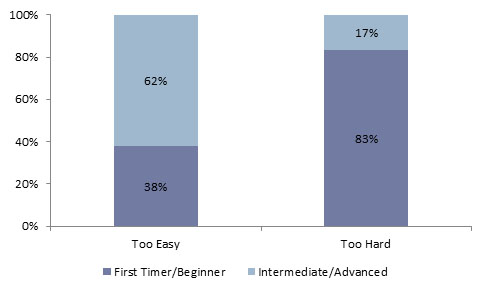In September 2010, the Colorado State Library (CSL) secured a $3.3 million Broadband Technology Opportunity Program (BTOP) grant including $2.3 million in federal funds, $754,000 from the Bill & Melinda Gates Foundation, and $316,234 in matching and in-kind donations from local libraries, CSL, and community organizations. This grant funded 50 grantees to build or enhance Public Computer Centers (PCCs) in 88 high-need urban and rural communities with high poverty rates, ethnic diversity, low broadband penetration, and/or limited access to public computers.
“I needed to refresh my skills on Excel before I took a test for a promotion…[The instructor] showed me how to do charts and graphs and helped me with keyboard shortcuts.” -BTOP Class Participant
One of the key activities of the CSL BTOP grant is for PCCs to offer computer training classes to the public. Class topics include basic internet and computer use (email, internet searching, social networking), office skills (Microsoft Office, presentations), job seeking (resume basics, job search strategies), multimedia (photo editing, website design), and mobile computing (e-books, mobile devices).
A total of 57 PCCs offered 1,364 classes to 8,625 participants between March and December 2011. Of these PCCs, 26 (46%) administered a survey in their classes to receive feedback from participants. Between May and December 2011, [note]Although the CSL BTOP project began in September 2010, survey administration did not begin until May 2011.[/note]1,755 participants completed the survey, which contained questions about the class, as well as about participants’ previous experience with computers.
This Fast Facts, which is the second in a three-part series about the CSL BTOP project’s first year, highlights the results from these surveys.[note]The other Fast Facts in this series report on 2011 location, equipment, usage, and training data [http://www.lrs.org/documents/fastfacts/311_bridging_digital_divide.pdf]; and workforce efforts and partnership [http://www.lrs.org/documents/fastfacts/313_Workforce_Efforts_Partnership.pdf].[/note]
“I have used Craigslist before, but only to browse for buying or renting. Now I feel confident to create postings. I want to sell things and advertise tutoring and gardening services. Thanks for offering this class.” – BTOP Class Participant
Participant Satisfaction
More than 9 in 10 respondents agreed or strongly agreed that the instructor presented the information clearly, that they learned a valuable skill in the class, and that they would be able to use what they learned (see Chart 1). (All percentages were calculated based on the number of respondents who answered each question.) Overall, respondents expressed satisfaction with the classes, with more than 95% strongly agreeing or agreeing that they would recommend the class to someone else.
Chart 1
PCC Class Participant Feedback
Class Level of Difficulty
Regarding the level of difficulty, 9 in 10 respondents (89%) indicated that their class was “just about right” (see Chart 2). The remaining 11% found their class to be either “too easy” or “too hard.”
Chart 2
Class Level of Difficulty
Participant Level of Computer Experience
Prior to the class, close to two-thirds (61%) of the participants determined their level of computer experience to be either first timer or beginner (see Chart 3). The remaining 39% identified their level as either intermediate or advanced.
Chart 3
Level of Experience with Computers Prior to Class
Class Difficulty by Level of Computer Experience
Most of the respondents who found their class to be too hard (83%) identified themselves as first timers or beginners (see Chart 4). Consistent with this data is that 6 in 10 respondents (62%) who rated the class as too easy possessed an intermediate or advanced level of experience with computers.
Chart 4
Class Difficulty by Level of Computer Experience
Learning about the Class
Results from the survey showed that 7 out of 10 respondents learned about the class from the library (staff, website, email, flyer) (see Chart 5). The remaining 30% learned about the class from a family member or friend, the community (banner, yard sign, flyer), newspaper, radio, or “other” sources (Workforce center, Denver Green Jobs, iCast, etc.).
“I’ve recommended these classes to my family and friends. Thank you for offering these classes.”
-BTOP Class Participant
Chart 5
How Respondents Learned About the Class
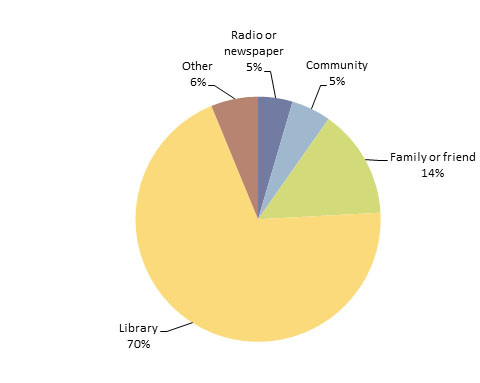 /p>
/p>
Conclusion
The PCC class participant survey data demonstrates that Colorado libraries and PCCs are providing computer training classes where patrons are learning new technology skills that they value. Having free and reliable broadband internet access at PCCs empowers patrons across Colorado to use their newly learned skills to improve and enrich their own lives. As one participant shared, the class is “excellent in getting started—the rest is up to me.”
